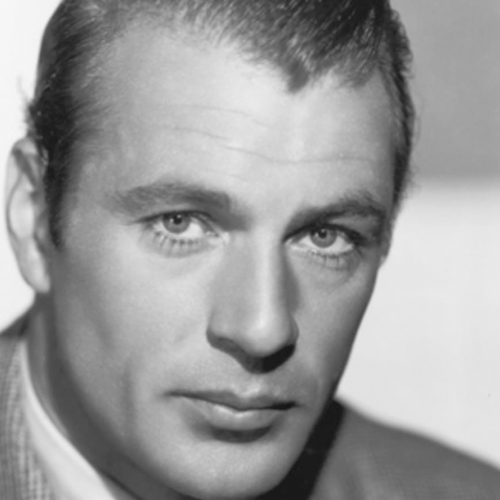
Gary Cooper
Born: 7 May 1901
Died: 13 May 1961 (60 Years)
Cause: On April 14, 1960, Cooper underwent surgery at Massachusetts General Hospital in Boston for an aggressive form of prostate cancer that had metastasized to his colon.
In his last public statement on May 4, 1961, Cooper said, "I know that what is happening is God's will. I am not afraid of the future." He received the last rites on Friday, May 12, and died quietly the next day.
Died: 13 May 1961 (60 Years)
Cause: On April 14, 1960, Cooper underwent surgery at Massachusetts General Hospital in Boston for an aggressive form of prostate cancer that had metastasized to his colon.
In his last public statement on May 4, 1961, Cooper said, "I know that what is happening is God's will. I am not afraid of the future." He received the last rites on Friday, May 12, and died quietly the next day.
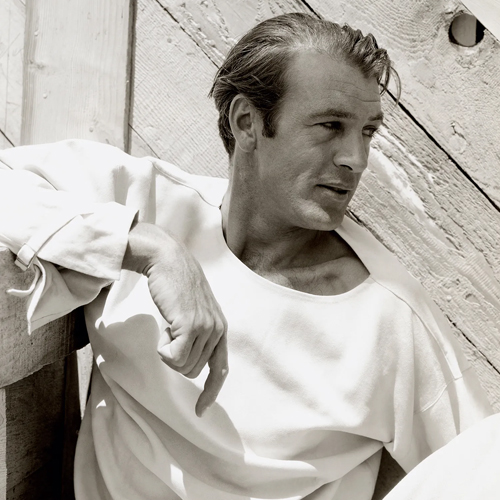
Gary Cooper
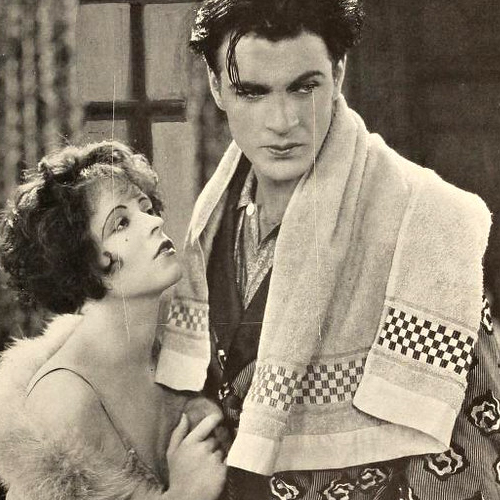
Gary Cooper with Clara Bow 1929
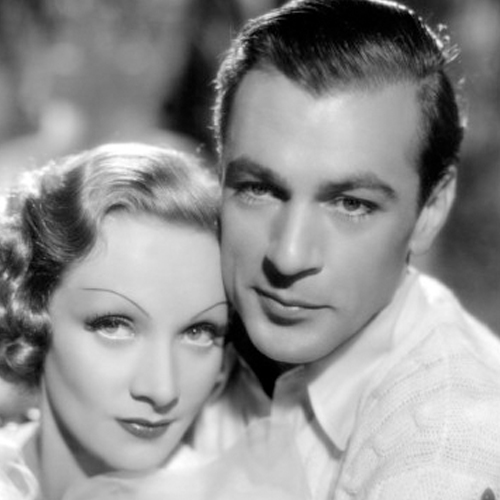
Gary Cooper with Marlene Dietrich
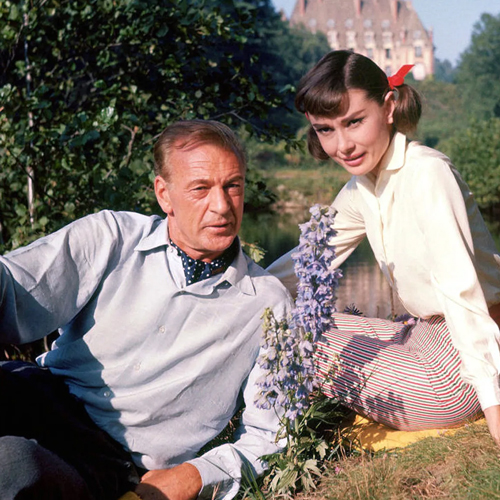
Gary Cooper with Audrey Hepburn
Gary Cooper (born Frank James Cooper; May 7, 1901 – May 13, 1961) was an American actor known for his strong, quiet screen persona and understated acting style. He won the Academy Award for Best Actor twice and had a further three nominations, as well as an Academy Honorary Award in 1961 for his career achievements. He was one of the top 10 film personalities for 23 consecutive years and one of the top money-making stars for 18 years. The American Film Institute (AFI) ranked Cooper at No. 11 on its list of the 25 greatest male stars of classic Hollywood cinema.
Cooper's career spanned 36 years, from 1925 to 1961, and included leading roles in 84 feature films. He was a major movie star from the end of the silent film era through to the end of the golden age of Classical Hollywood. His screen persona appealed strongly to both men and women, and his range included roles in most major film genres. His ability to project his own personality onto the characters he played contributed to his natural and authentic appearance on screen. Throughout his career, he sustained a screen persona that represented the ideal American hero.
Cooper began his career as a film extra and stunt rider but soon landed acting roles. After establishing himself as a Western hero in his early silent films, he appeared as the Virginian and became a movie star in 1929 with his first sound picture, The Virginian. In the early 1930s, he expanded his heroic image to include more cautious characters in adventure films and dramas such as A Farewell to Arms (1932) and The Lives of a Bengal Lancer (1935). During the height of his career Cooper portrayed a new type of hero, a champion of the common man in films such as Mr. Deeds Goes to Town (1936), Meet John Doe (1941), Sergeant York (1941), The Pride of the Yankees (1942), and For Whom the Bell Tolls (1943). He later portrayed more mature characters at odds with the world in films such as The Fountainhead (1949) and High Noon (1952). In his final films, he played non-violent characters searching for redemption in films such as Friendly Persuasion (1956) and Man of the West (1958).
On April 14, 1960, Cooper underwent surgery at Massachusetts General Hospital in Boston for an aggressive form of prostate cancer that had metastasized to his colon. He fell ill again on May 31 and underwent further surgery at Lebanon Hospital in Los Angeles in early June to remove a malignant tumor from his large intestine. After recuperating over the summer, Cooper took his family on vacation to the south of France before traveling to the UK in the fall to star in The Naked Edge. In December 1960, he worked on the NBC television documentary The Real West, which was part of the company's Project 20 series.
On December 27 his wife learned from their family doctor that Cooper's cancer had spread to his lungs and bones and was inoperable. His family decided not to tell him immediately.
On January 9, 1961, Cooper attended a dinner given in his honor and hosted by Frank Sinatra and Dean Martin at the Friars Club. The dinner was attended by many of his industry friends and concluded with a brief speech by Cooper who said, "The only achievement I'm proud of is the friends I've made in this community."
In mid-January, Cooper took his family to Sun Valley for their last vacation together. Cooper and Hemingway hiked through the snow together for the last time. On February 27, after returning to Los Angeles, Cooper learned that he was dying. He later told his family, "We'll pray for a miracle; but if not, and that's God's will, that's all right too."On April 17, Cooper watched the Academy Awards ceremony on television and saw his good friend James Stewart, who had presented Cooper with his first Oscar years earlier, accept on Cooper's behalf an honorary award for lifetime achievement – his third Oscar. Holding back tears, Stewart said, "Coop, I'll get this to you right away. And Coop, I want you to know this, that with this goes all the warm friendship and the affection and the admiration and the deep, the deep respect of all of us. We're very, very proud of you, Coop. All of us are tremendously proud." The following day, newspapers around the world announced that Cooper was dying. In the coming days he received numerous messages of appreciation and encouragement, including telegrams from Pope John XXIII and Queen Elizabeth II, and a telephone call from President John F. Kennedy.
In his last public statement on May 4, 1961, Cooper said, "I know that what is happening is God's will. I am not afraid of the future." He received the last rites on Friday, May 12, and died quietly the next day.
A requiem was held on May 18 at the Church of the Good Shepherd, attended by many of Cooper's friends, including James Stewart, Jack Benny, Henry Hathaway, Joel McCrea, Audrey Hepburn, Jack L. Warner, John Ford, John Wayne, Edward G. Robinson, Frank Sinatra, Dean Martin, Fred Astaire, Randolph Scott, Walter Pidgeon, Bob Hope and Marlene Dietrich. Cooper was buried in the Grotto of Our Lady of Lourdes in Holy Cross Cemetery in Culver City, California. In May 1974, after his family relocated to New York, Cooper's remains were exhumed and reburied in Sacred Hearts Cemetery in Southampton. His grave is marked by a three-ton boulder from a Montauk quarry.
Cooper's career spanned 36 years, from 1925 to 1961, and included leading roles in 84 feature films. He was a major movie star from the end of the silent film era through to the end of the golden age of Classical Hollywood. His screen persona appealed strongly to both men and women, and his range included roles in most major film genres. His ability to project his own personality onto the characters he played contributed to his natural and authentic appearance on screen. Throughout his career, he sustained a screen persona that represented the ideal American hero.
Cooper began his career as a film extra and stunt rider but soon landed acting roles. After establishing himself as a Western hero in his early silent films, he appeared as the Virginian and became a movie star in 1929 with his first sound picture, The Virginian. In the early 1930s, he expanded his heroic image to include more cautious characters in adventure films and dramas such as A Farewell to Arms (1932) and The Lives of a Bengal Lancer (1935). During the height of his career Cooper portrayed a new type of hero, a champion of the common man in films such as Mr. Deeds Goes to Town (1936), Meet John Doe (1941), Sergeant York (1941), The Pride of the Yankees (1942), and For Whom the Bell Tolls (1943). He later portrayed more mature characters at odds with the world in films such as The Fountainhead (1949) and High Noon (1952). In his final films, he played non-violent characters searching for redemption in films such as Friendly Persuasion (1956) and Man of the West (1958).
On April 14, 1960, Cooper underwent surgery at Massachusetts General Hospital in Boston for an aggressive form of prostate cancer that had metastasized to his colon. He fell ill again on May 31 and underwent further surgery at Lebanon Hospital in Los Angeles in early June to remove a malignant tumor from his large intestine. After recuperating over the summer, Cooper took his family on vacation to the south of France before traveling to the UK in the fall to star in The Naked Edge. In December 1960, he worked on the NBC television documentary The Real West, which was part of the company's Project 20 series.
On December 27 his wife learned from their family doctor that Cooper's cancer had spread to his lungs and bones and was inoperable. His family decided not to tell him immediately.
On January 9, 1961, Cooper attended a dinner given in his honor and hosted by Frank Sinatra and Dean Martin at the Friars Club. The dinner was attended by many of his industry friends and concluded with a brief speech by Cooper who said, "The only achievement I'm proud of is the friends I've made in this community."
In mid-January, Cooper took his family to Sun Valley for their last vacation together. Cooper and Hemingway hiked through the snow together for the last time. On February 27, after returning to Los Angeles, Cooper learned that he was dying. He later told his family, "We'll pray for a miracle; but if not, and that's God's will, that's all right too."On April 17, Cooper watched the Academy Awards ceremony on television and saw his good friend James Stewart, who had presented Cooper with his first Oscar years earlier, accept on Cooper's behalf an honorary award for lifetime achievement – his third Oscar. Holding back tears, Stewart said, "Coop, I'll get this to you right away. And Coop, I want you to know this, that with this goes all the warm friendship and the affection and the admiration and the deep, the deep respect of all of us. We're very, very proud of you, Coop. All of us are tremendously proud." The following day, newspapers around the world announced that Cooper was dying. In the coming days he received numerous messages of appreciation and encouragement, including telegrams from Pope John XXIII and Queen Elizabeth II, and a telephone call from President John F. Kennedy.
In his last public statement on May 4, 1961, Cooper said, "I know that what is happening is God's will. I am not afraid of the future." He received the last rites on Friday, May 12, and died quietly the next day.
A requiem was held on May 18 at the Church of the Good Shepherd, attended by many of Cooper's friends, including James Stewart, Jack Benny, Henry Hathaway, Joel McCrea, Audrey Hepburn, Jack L. Warner, John Ford, John Wayne, Edward G. Robinson, Frank Sinatra, Dean Martin, Fred Astaire, Randolph Scott, Walter Pidgeon, Bob Hope and Marlene Dietrich. Cooper was buried in the Grotto of Our Lady of Lourdes in Holy Cross Cemetery in Culver City, California. In May 1974, after his family relocated to New York, Cooper's remains were exhumed and reburied in Sacred Hearts Cemetery in Southampton. His grave is marked by a three-ton boulder from a Montauk quarry.
Career assessment and legacy
Cooper's career spanned thirty-six years, from 1925 to 1961. During that time he appeared in eighty-four feature films in a leading role. He was a major movie star from the end of the silent film era to the end of the golden age of Classical Hollywood. His natural and authentic acting style appealed powerfully to both men and women, and his range of performances included roles in most major movie genres, including Westerns, war films, adventure films, drama films, crime films, romance films, comedy films, and romantic comedy films. He appeared on the Motion Picture Herald exhibitor's poll of top ten film personalities for twenty-three consecutive years, from 1936 to 1958. According to Quigley's annual poll, Cooper was one of the top money-making stars for eighteen years, appearing in the top ten in 1936–37, 1941–49, and 1951–57. He topped the list in 1953. In Quigley's list of all-time money-making stars, Cooper is listed fourth, after John Wayne, Clint Eastwood, and Tom Cruise. At the time of his death, it was estimated that his films grossed well over $200 million (equivalent to $1.81 billion in 2021).
In more than half his feature films, Cooper portrayed Westerners, soldiers, pilots, sailors, and explorers – all men of action. In the rest he played a wide range of characters, included doctors, professors, artists, architects, clerks, and baseball players. Cooper's heroic screen image changed with each period of his career. In his early films, he played the young naive hero sure of his moral position and trusting in the triumph of simple virtues (The Virginian). After becoming a major star, his Western screen persona was replaced by a more cautious hero in adventure films and dramas (A Farewell to Arms). During the height of his career, from 1936 to 1943, he played a new type of hero: a champion of the common man willing to sacrifice himself for others (Mr. Deeds, Meet John Doe, and For Whom the Bell Tolls).
In the post-war years, Cooper attempted broader variations on his screen image, which now reflected a hero increasingly at odds with the world who must face adversity alone (The Fountainhead and High Noon). In his final films, Cooper's hero rejects the violence of the past, and seeks to reclaim lost honor and find redemption (Friendly Persuasion and Man of the West). The screen persona he developed and sustained throughout his career represented the ideal American hero – a tall, handsome, and sincere man of steadfast integrity who emphasized action over intellect, and combined the heroic qualities of the romantic lover, the adventurer, and the common man.
On February 6, 1960, Cooper was awarded a star on the Hollywood Walk of Fame at 6243 Hollywood Boulevard for his contribution to the film industry. He was awarded a star on the sidewalk outside the Ellen Theater in Bozeman, Montana.
On May 6, 1961, Cooper was awarded the French Order of Arts and Letters in recognition of his significant contribution to the arts. On July 30, 1961, he was posthumously awarded the David di Donatello Special Award in Italy for his career achievements.
In 1966 Cooper was inducted into the Hall of Great Western Performers at the National Cowboy & Western Heritage Museum in Oklahoma City. In 2015, he was inducted into the Utah Cowboy and Western Heritage Hall of Fame. The American Film Institute (AFI) ranked Cooper eleventh on its list of the 25 male stars of classic Hollywood. Three of his characters – Will Kane, Lou Gehrig, and Sergeant York – made AFI's list of the one hundred greatest heroes and villains, all of them as heroes. His Lou Gehrig line, "Today, I consider myself the luckiest man on the face of the earth.", is ranked by AFI as the thirty-eighth greatest movie quote of all time.
More than half a century after his death Cooper's enduring legacy, according to biographer Jeffrey Meyers, is his image of the ideal American hero preserved in his film performances. Charlton Heston once observed, "He projected the kind of man Americans would like to be, probably more than any actor that's ever lived."
In the TV series Justified, based on works and characters created by Elmore Leonard, Gary Cooper is used throughout the six seasons as the man whom U.S. Marshall Raylan Givens, played by Timothy Olyphant, aspires to be. When his colleague asks Marshall Givens how he thinks his dangerous plan to bring down a villain can possibly work, he replies: "Why not? Worked for Gary Cooper."
Gary Cooper is referenced several times in the critically acclaimed television series The Sopranos, with protagonist Tony Soprano asking "What ever happened to Gary Cooper? The strong, silent type ..." while complaining about his problems to his therapist.
In the 1930s hit song "Puttin' On the Ritz", Cooper is referenced in the line "dress up like a million dollar trooper/Tryin' hard to look like Gary Cooper, Super duper!" More than two decades after Cooper's death a new version of the song was released in 1983 by Taco; the original lyrics were kept, including the references to Cooper.
In J. D. Salinger's The Catcher in the Rye, Cooper is "spotted" by Holden Caulfield to distract a woman he is dancing with.
(wikipedia)
Cooper's career spanned thirty-six years, from 1925 to 1961. During that time he appeared in eighty-four feature films in a leading role. He was a major movie star from the end of the silent film era to the end of the golden age of Classical Hollywood. His natural and authentic acting style appealed powerfully to both men and women, and his range of performances included roles in most major movie genres, including Westerns, war films, adventure films, drama films, crime films, romance films, comedy films, and romantic comedy films. He appeared on the Motion Picture Herald exhibitor's poll of top ten film personalities for twenty-three consecutive years, from 1936 to 1958. According to Quigley's annual poll, Cooper was one of the top money-making stars for eighteen years, appearing in the top ten in 1936–37, 1941–49, and 1951–57. He topped the list in 1953. In Quigley's list of all-time money-making stars, Cooper is listed fourth, after John Wayne, Clint Eastwood, and Tom Cruise. At the time of his death, it was estimated that his films grossed well over $200 million (equivalent to $1.81 billion in 2021).
In more than half his feature films, Cooper portrayed Westerners, soldiers, pilots, sailors, and explorers – all men of action. In the rest he played a wide range of characters, included doctors, professors, artists, architects, clerks, and baseball players. Cooper's heroic screen image changed with each period of his career. In his early films, he played the young naive hero sure of his moral position and trusting in the triumph of simple virtues (The Virginian). After becoming a major star, his Western screen persona was replaced by a more cautious hero in adventure films and dramas (A Farewell to Arms). During the height of his career, from 1936 to 1943, he played a new type of hero: a champion of the common man willing to sacrifice himself for others (Mr. Deeds, Meet John Doe, and For Whom the Bell Tolls).
In the post-war years, Cooper attempted broader variations on his screen image, which now reflected a hero increasingly at odds with the world who must face adversity alone (The Fountainhead and High Noon). In his final films, Cooper's hero rejects the violence of the past, and seeks to reclaim lost honor and find redemption (Friendly Persuasion and Man of the West). The screen persona he developed and sustained throughout his career represented the ideal American hero – a tall, handsome, and sincere man of steadfast integrity who emphasized action over intellect, and combined the heroic qualities of the romantic lover, the adventurer, and the common man.
On February 6, 1960, Cooper was awarded a star on the Hollywood Walk of Fame at 6243 Hollywood Boulevard for his contribution to the film industry. He was awarded a star on the sidewalk outside the Ellen Theater in Bozeman, Montana.
On May 6, 1961, Cooper was awarded the French Order of Arts and Letters in recognition of his significant contribution to the arts. On July 30, 1961, he was posthumously awarded the David di Donatello Special Award in Italy for his career achievements.
In 1966 Cooper was inducted into the Hall of Great Western Performers at the National Cowboy & Western Heritage Museum in Oklahoma City. In 2015, he was inducted into the Utah Cowboy and Western Heritage Hall of Fame. The American Film Institute (AFI) ranked Cooper eleventh on its list of the 25 male stars of classic Hollywood. Three of his characters – Will Kane, Lou Gehrig, and Sergeant York – made AFI's list of the one hundred greatest heroes and villains, all of them as heroes. His Lou Gehrig line, "Today, I consider myself the luckiest man on the face of the earth.", is ranked by AFI as the thirty-eighth greatest movie quote of all time.
More than half a century after his death Cooper's enduring legacy, according to biographer Jeffrey Meyers, is his image of the ideal American hero preserved in his film performances. Charlton Heston once observed, "He projected the kind of man Americans would like to be, probably more than any actor that's ever lived."
In the TV series Justified, based on works and characters created by Elmore Leonard, Gary Cooper is used throughout the six seasons as the man whom U.S. Marshall Raylan Givens, played by Timothy Olyphant, aspires to be. When his colleague asks Marshall Givens how he thinks his dangerous plan to bring down a villain can possibly work, he replies: "Why not? Worked for Gary Cooper."
Gary Cooper is referenced several times in the critically acclaimed television series The Sopranos, with protagonist Tony Soprano asking "What ever happened to Gary Cooper? The strong, silent type ..." while complaining about his problems to his therapist.
In the 1930s hit song "Puttin' On the Ritz", Cooper is referenced in the line "dress up like a million dollar trooper/Tryin' hard to look like Gary Cooper, Super duper!" More than two decades after Cooper's death a new version of the song was released in 1983 by Taco; the original lyrics were kept, including the references to Cooper.
In J. D. Salinger's The Catcher in the Rye, Cooper is "spotted" by Holden Caulfield to distract a woman he is dancing with.
(wikipedia)

